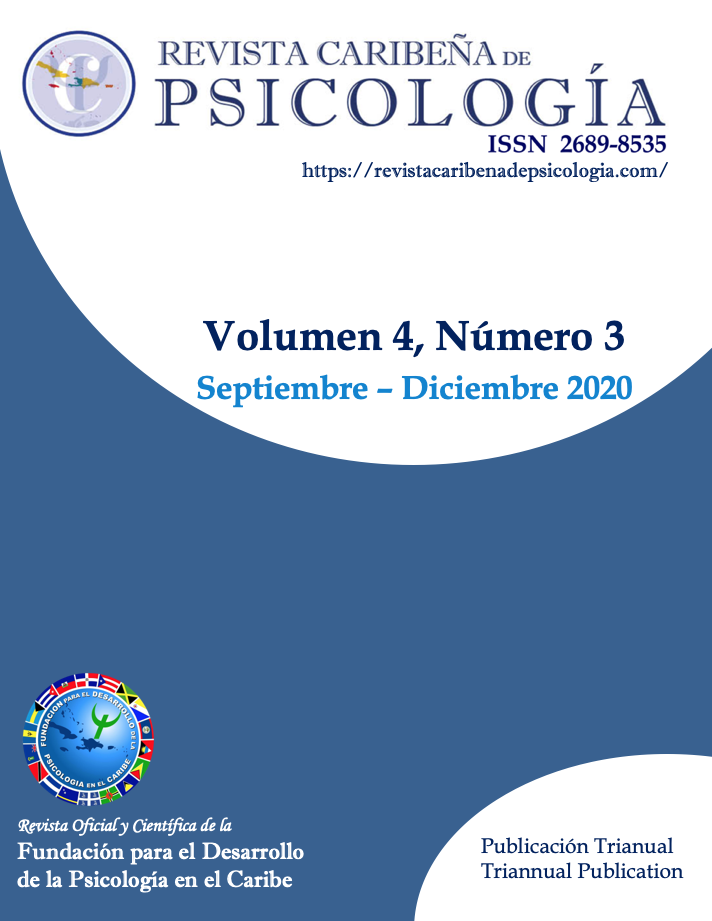Psychometric Properties of the Evidence-Based Professional Practice Scale in a Sample of Clinical Psychologists in the Dominican Republic
DOI:
https://doi.org/10.37226/rcp.v4i3.5291Keywords:
psychometric properties, evidence-based practices, validation, Dominican RepublicAbstract
This study evaluated the psychometric properties of the Evidence-Based Professional Practice Scale (EPPBE). A probabilistic sample of 235 clinical psychologists who work in state hospitals and in private practice in the Dominican Republic was selected. The results of this study support an internal structure of three factors, as proposed by its authors, and similar to the results obtained with a sample of clinical psychologists from Puerto Rico with whom the EPPBE was initially developed and validated. Also, the correlations between the dimensions (e.g, knowledge) of the EPPBE were very good (between r = .57 and .89). The correlations between these dimensions and the Social Desirability Scale were less robust (between r = -.17 to -.21). Furthermore, the internal consistency (Cronbach’s alfa, α) of the EPPBE was also very good, ranging in dimensions between α = .92 and .94, and .94 among all items of the instrument. The results suggested that the EPPBE is an instrument which allows for valid and reliable inferences regarding the attitudes, behaviors and evidence-based knowledge of professional practices in a sample of clinical psychologists in the Dominican Republic.
References
Aarons, G. A. (2005). Measuring provider attitudes toward evi-dence-based practice: consideration of organizational context and individual differences. Child and Adolescent Psychiatric Clinics of North America, 14(2), 255-271. https://doi.org/10.1016/j.chc.2004.04.008
Aarons, G.A. (2004). Mental health provider attitudes toward adoption of evidence-based practice: The Evidence-Based Practice Attitude Scale. Mental Health Services Research, 6, 61-74. https://doi.org/10.1023/B:MHSR.0000024351.12294.65
American Psychological Association, Presidential Task Force on Evidence-Based Practice. (2006). Evidence-based practice in psychology. American Psychologist, 61(4), 271–285. https://doi.org/10.1037/0003-066X.61.4.271
Antony, M. M., & Rowa, K. (2205). Evidence-Based Assessment of Anxiety Disorders in Adults. Psycholgical Assessment, 17(3), 256-266. https://doi.org/10.1037/1040-3590.17.3.256
Asociación Americana de Psicología. (2010). APA diccionario conci-so de psicología (J. L., Núñez Herrejón, M. E. Ortiz Salinas, Trads. Manual Moderno.
Beevers, C. G. (2011). Introduction: Evidence-based practice for major depressive disorder. In D. W. Springer, A. Rubin, & C. G. Beevers (Eds.), Clinician's guide to evidence-based practice series. Treatment of depression in adolescents and adults (p. 1–19). John Wiley & Sons Inc. https://doi.org/10.1002/9781118094754.ch1
Benito, E. (2009). La formación en psicología: Revisión y perspec-tivas. Revista Psiencia, 1 (2), 3-10. http://dx.doi.org/10.5872/psiencia.v1i2.16
Bentler, P.M. (2005). EQS 6 Structural equations program manual. Multivariate Software, Inc.
Bernal, G. (2007). La psicología clínica en Puerto Rico. Revista Puertorriqueña de Psicología, 17, 343-388.
Bernal, G., & Rodríguez-Soto, N. del C. (2010). Development and Psychometric Properties of the Evidence-based Professional Practice Scale (EBPP-S). Puerto Rico Health Sciences Journal, 29(4), 385-390.
Bernal, G., & Rodríguez-Soto, N. del C. (2012). La práctica psicológi-ca basada en la evidencia: hacia una integración de la investigación, el peritaje profesional, la singularidad del/a cliente, su contexto y la ética. En A. Martínez-Taboas & N. Quintero (Eds.), Practicas psicológicas basadas en la evidencia: Una perspectiva hispana. Pu-blicaciones Puertorriqueñas.
Bernstein, D., & Nietzel, M. (1982). Introducción a la psicología clínica. (6ta ed). Mc Graw Gill.
Byrne, B.M. (2016). Structural equation modeling with AMOS: Basic concepts, applications, and programming. Lawrence Erlbaum As-sociates.
Chambless, D. L. (1996). In defense of dissemination of empirical-ly suppoted psychological interventions. Clinical Psychology: Sciencie and Practice, 3(3), 230-235. https://doi.org/10.1111/j.1468-2850.1996.tb00074.x
Chou, C-P., Bentler, P.M. & Satorra, A. (1991). Scaled test statis-tics and robust standard errors for non-normal data in covari-ance structure analysis: A Monte Carlo study. British Journal of Mathematical and Statistical Psychology, 44, 347-357. https://doi.org/10.1111/j.2044-8317.1991.tb00966.x
DeCarlo, L.T. (1997). On the meaning and use of kurtosis. Psycho-logical Methods, 2, 292-307. https://doi.org/10.1037/1082-989X.2.3.292
DeVellis, R.F. (2017). Scale development: Theory and applications. SAGE Publications.
Documentos, Ley No. 22-01 (2004). Colegio Dominicano de Psicólo-gos. Editora Búho.
Fisher, L., & Navarro, A. (1995). Introducción a la Investigación de Mercados. McGraw Hill Interamericana.
Gaete Santelices, B., & Herrera Troncoso, C. (2010). Actitud hacia la práctica basada en la evidencia (PBE) en psicólogos clínicos de los centros comunitarios de salud mental (COSAM) de la provincia de Santiago. http://repositorio.uchile.cl/handle/2250/106253
Gallegos, M. (2010). Primera conferencia Latinoamericana sobre entrenamiento en psicología (1974): El modelo Latinoameri-cano y su significación histórica. Psicologia Ciência e Profissão, 30(4), 792-809. http://pepsic.bvsalud.org/pdf/pcp/v30n4/v30n4a10.pdf
Gray, MJ, Elhai, JD, & Schmidt, L.O. (2007). Actitudes de los pro-fesionales del trauma hacia y la utilización de prácticas basa-das en evidencia. Modificación del comportamiento, 31 (6), 732–748. https://doi.org/10.1177/0145445507302877
Hair, J.F., Black, W.C., Babin, B.J., & Anderson, R.E. (2019). Multi-variate data analysis. Cengage.
Hernández, C., De la Cruz, X., Mencía G. e Hidalgo G. (2018). Congreso Caribeño de Psicología: El camino de la integración. Fun-dación para el Desarrollo de la psicología en el Caribe.
Hu, L-T., Bentler, P.M. & Kano, Y. (1992). Can test statistics in covariance structure analysis be trusted? Psychological Bulletin, 112, 351-362. https://doi.org/10.1037/0033-2909.112.2.351
Jacobs, J. A., Jones, E., Gabella, B. A., Spring, B., & Brownson, R. C. (2012). Tools for implementing an evidence-based approach in public health practice. Preventing chronic disease, 9, E116. https://doi.org/10.5888/pcd9.110324
Juárez, A. R. (2016). Lightner Witmer y la primera clínica psicológica de niños de Estados Unidos. VIII Congreso Internacional de In-vestigación y Práctica Profesional en Psicología XXIII Jornadas de Investigación XII Encuentro de Investigadores en Psicolo-gía del MERCOSUR. Facultad de Psicología, Universidad de Buenos Aires, Buenos Aires.
Kazdin, A. E. y Weisz, J (2003) (Editors). Evidence-based psychother-apies for children and adolescents. The Guilford Press.
Levant, R. F., & Sperry, H. A. (2016). Components of evidence-based practice in psychology. In N. Zane, G. Bernal, & F. T. L. Leong (Eds.), Cultural, racial, and ethnic psychology book series. Evi-dence-based psychological practice with ethnic minorities: Culturally informed research and clinical strategies (p. 15–29). American Psychological Association. https://doi.org/10.1037/14940-002
Martínez, A. D., Aguilera C., Cañabate A., Mena A. L., & Remesal, R. (2018). Tratamientos basados en la evidencia para la anore-xia nerviosa. Boletín Psicoevidencias nº 51. https://www.psicoevidencias.es/contenidos-psicoevidencias/resumenes-de-evidencia/10-tratamientos-basados-en-la-evidencia-para-la-anorexia/file
Miller, P. M. (2009) (Edited). Evidence-Based Addiction Treatment. Academic Press.
Montero, I., & Le.n, O. G. (2007). A guide for naming research studies in psychology. International Journal of Clinical and Health Psychology, 7(3), 847-862.
Nelson, T., & Steele R. (2007). Predictors of practitioner self-reported use of evidence-based practices: practitioner trai-ning, clinical setting, and attitudes toward research. Adminis-tration and Policy in Mental Health, 34(4). https://doi.org/10.1007/s10488-006-0111-x
Nicolás, G., & Martínez, G. (2015). Evaluación de prácticas en psicología clínica dominicana. Psiencia, 7(1), (41-53). http://dx.doi.org/10.5872/psiencia.v7i1.138
Plan nacional de salud mental: República Dominicana 2019-2022. (2019). Ministerio de Salud Pública, Santo Domingo.
Regionales de salud (2020). Servicio Nacional de Salud. Santo Do-mingo. https://sns.gob.do/servicios/establecimientos-de-salud#
Rosario-Hernández, E., & Rovira Millán, L.V. (2002). Desarrollo y validación de una escala para medir actitudes hacia el retiro. Revista de Psicología Puertorriqueña. 13, 45-60.
Rye, M., Torres, E. M., Friborg, O., Skre, I., & Aarons, G. A. (2017). The Evidence-based Practice Attitude Scale-36 (EBPAS-36): a brief and pragmatic measure of attitudes to evidence-based practice validated in US and Norwegian samples. Implementa-tion science: IS, 12(1), 44. https://doi.org/10.1186/s13012-017-0573-0
Sánchez, J. A. (2003). La formación del psicólogo en una perspectiva internacional. Universidad del Bosque: Bogotá.
Satorra, A. & Bentler, P.M. (1988). Scaling corrections for chi-square statistics in covariance structure analysis. American Statistical associations 1988 procedings of the business and econom-ics section (pp. 308-313). Alexandria, VA: American Statistical Association.
Trull, T. J. Y Phares, E.J. (2003). Psicología clínica. Thomson.
West, S.G., Finch, J.F. & Curran, P.J. (1995). Structural equation models with non-normal data variables: Problems and remedies. En R.H. Hoyle (Ed.), Structural equation modeling: Concepts, issues, and applications (pp. 56-75). Thousand Oaks, SAGE Publica-tions.
Published
How to Cite
Issue
Section
License
Copyright (c) 2020 Carlos R. Hernández, Ernesto Rosario-Hernández, Alexis Lorenzo Ruiz

This work is licensed under a Creative Commons Attribution 4.0 International License.







